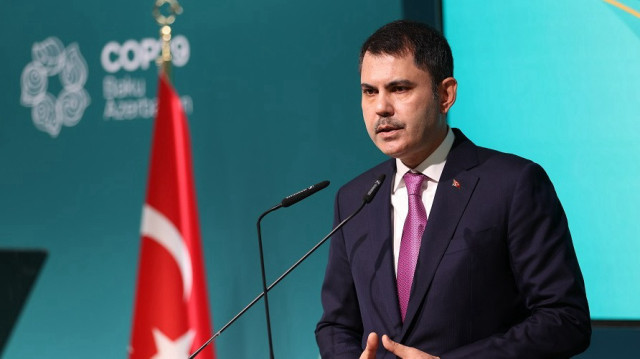
Turkish environment minister unveils ambitious climate roadmap at UN Climate Change Conference in Baku, Azerbaijan
Türkiye plans to increase the share of renewable energy to 50% and nuclear energy to 30% of primary energy by 2053, the country's environment, urbanization and climate change minister said on Wednesday.
Murat Kurum explained his country's 2053 Net Zero Emissions target on the sidelines of the UN Climate Change Conference (COP29) in Baku, Azerbaijan.
"We plan to increase renewable energy's share to 50% of primary energy and nuclear to 30%, decarbonizing approximately 80% of our national energy consumption,” he noted.
Türkiye has raised its renewable energy capacity to 59%, ranking fifth in Europe and 11th worldwide, according to Kurum.
Noting that Ankara sets ambitious targets for the energy sector, which accounts for the majority of emissions, he said 72% of Türkiye's emissions come from energy, 13% from agriculture, and 3% from waste.
In industrial targets for 2053, Türkiye aims to reduce emissions by 93% in cement, 99% in iron and steel, and 75% in aluminum, he added.
The minister stated that the building sector aims for near-zero emissions by 2053, potentially preventing 2 billion tons of CO2-equivalent emissions.
- COP29 turning point in climate finance
Kurum underlined the importance of climate finance for securing financial resources for climate action.
"Facilitating access to climate finance is essential for a fairer world. We declare at every platform that we see COP29 as a turning point in climate finance," Kurum said, emphasizing the importance of securing financial resources for climate action.
Citing World Meteorological Organization data, he said the climate-related disasters over the last 50 years resulted in more than two million deaths and $4.5 trillion in economic losses.
- Localization of electric vehicles to 75% by 2035
Türkiye plans to expand its high-speed rail network to 7,000 kilometers by 2053, increasing rail's share in logistics from 5% to 22%, according to the minister.
Kurum noted that by 2035, Türkiye aims for 4.2 million electric vehicles with a 75% localization rate, reducing greenhouse gas emissions from road transport.
In waste management, Türkiye will phase out landfill disposal, increase recycling rates to 70%, and implement a Deposit Management System by 2025 to curb methane emissions, he stated.
"In agriculture, we will expand organic farming to 10% of farmland, optimize livestock feed, expand biogas facilities, and prioritize food security. In forestry, we will increase carbon sink capacity through conservation, green spaces, and green corridors," Kurum added.
- Increasing agricultural irrigation efficiency
Kurum also outlined strategies to reduce urban water losses, improve irrigation efficiency, and implement smart water management.
"We will expand sustainable forest management, combat desertification, and develop climate-resilient building standards in our cities,” he said.
The long-term strategy includes cross-cutting policies to support hydrogen, carbon capture, and smart city technologies, aiming for a fair transition with new jobs and skills, according to the minister.
Kurum anticipated Türkiye's Climate Law will be passed this year, accelerating the green transformation and aligning with the EU's Carbon Border Adjustment Mechanism in 2026.
- Türkiye's candidacy for COP31 presidency
Kurum stressed Türkiye's potential to turn climate challenges into opportunities, especially within vulnerable regions like the Mediterranean, Asia-Pacific, and Africa.
"We see the COP31 presidency as a chance to share our experience and contribute to global climate action,” he stressed.
The minister noted that Turkish President Recep Tayyip Erdogan announced Ankara's candidacy for COP31.
"Türkiye will act as a bridge between developed and developing countries, supporting climate justice, technology transfer, and financial resources for all nations.
"We pledge to adopt a fair, sustainable, inclusive, and transparent approach and hope for the support of all our friends,” he said.

